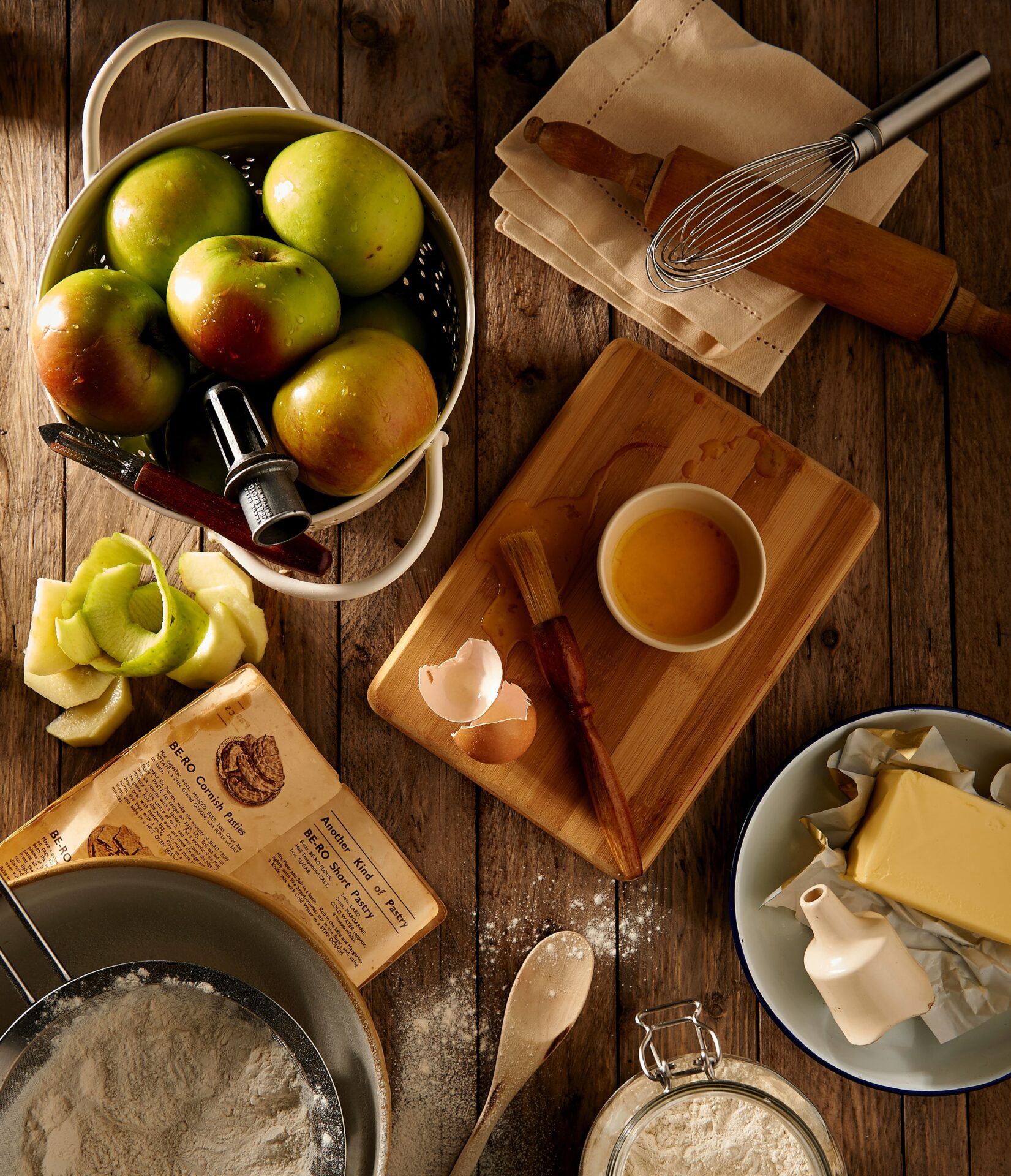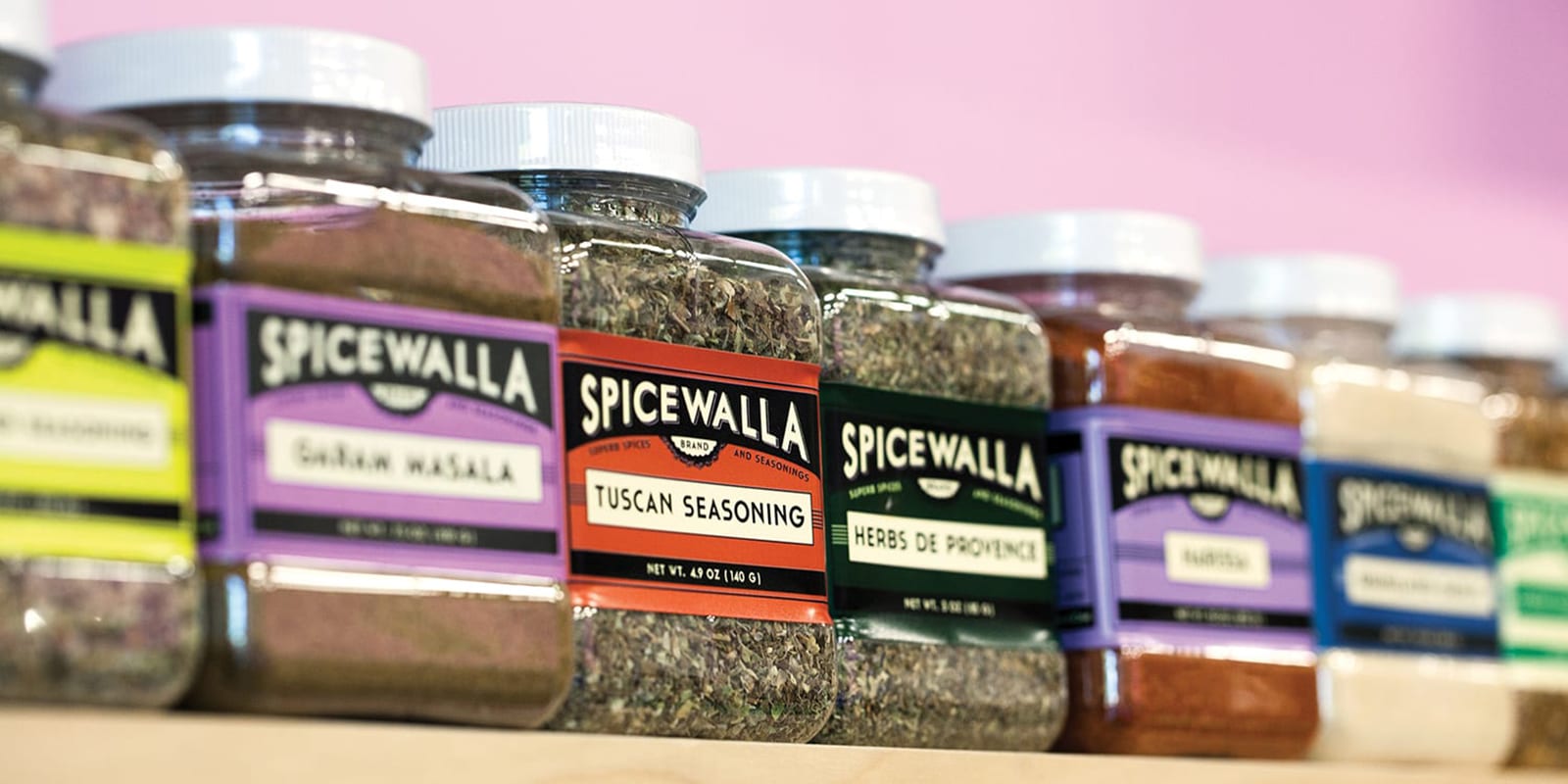Cardamom + Coriander
With five restaurants under his belt, chef Meherwan Irani is looking to shake up the spice world in his latest venture
Most chefs want you to fall for their flavors on first taste. Meherwan Irani is after your first sniff. His new spice brand, Spicewalla, tingles even the most discerning noses—and, certainly, makes mouths water—with fresh, small-batch spices, dried herbs, and seasonings sourced from suppliers around the world. Of the hundred-plus spices and blends in the Spicewalla lineup, stock includes bright green cardamom pods and cut ginger, Sicilian sea salt and bay leaves, Cowboy steak rub and Madras curry powder. Designed for home cooks as well as top chefs, and sold in sizes from two-ounce tins to two-gallon bags, Spicewalla is on a mission to infiltrate—and elevate—the kitchens of the Southeast and beyond from a small, no-frills factory in Asheville, North Carolina.

“The only thing throughout the history of mankind that has added flavor to differentiate not just the ingredient, but the culture, the religion, the country, is spices,” Irani says, with the resolve of a zealot. “Pork is pork, and the only thing different is what we put on it. Why not make that the absolute best you can find? Why shortcut that? Look at how much care we put into sourcing everything else, yet I will still see one-year-old jars [of spices] being delivered to restaurants.” The inconvenient truth about spices? The longer they sit on a shelf, the less impact they make—on your nose as well as your taste buds. “Spices are about aroma as much as they are about taste,” Irani says. He compares his spices and grocery-store spices as the difference between two-year-old coffee beans and a freshly roasted batch. “If you can’t smell your coffee you know your beans are old. If you open a jar of spices and can’t smell it, that’s what you’re getting in your cooking.
Most chefs want you to fall for their flavors on first taste. Meherwan Irani is after your first sniff.
Spicewalla is built on Irani’s relationships with a network of quality spice suppliers, and a commitment to expediting the timeline. “Freshness is the biggest differentiator in quality,” Irani says. “We’re trying to get spices from when they arrive at the port to the shelves of a [kitchen] in sixty days max. Usually it would be more like two years.” Add the care the Spicewalla folks take to roast, grind, and pack all their spices by hand, and the results are nothing short of revelatory. Just ask Katie Button, a James Beard semifinalist and the reigning queen of Asheville’s acclaimed food scene as the chef and owner of Spanish tapas bar Cúrate, small-plates date spot Nightbell, and her newest, Button & Co. Bagels. She’s but one of many local chefs who call themselves Spicewalla converts, along with fellow chefs Jacob Sessoms, Brian Canipelli, Patrick O’Cain, John Fleer, and Matt Dawes, plus Atlanta chefs Brian Wolfe and Keith Remes, among others. “If you take a container of Spicewalla’s black peppercorn, for example, and smell it next to what I was buying before—it’s like night and day,” says Button, who uses everything from minced garlic and poppy seeds on her bagel toppings to garam masala for Cúrate’s addictive lamb skewers. “I had been buying premium spices from specialty places, but none of them have the aromatics that Spicewalla offers. It’s been mind-blowing for me. I toured their facility and smelled some coriander seed; I had no idea that coriander smelled like that. It was lemony and bright, with so many more aromas than when I typically smell it. That’s when I realized that 99 percent of the spices out in the world—and pretty much all that you can buy in a grocery store—are pretty much garbage in comparison.”
Chef at the Helm
Of course, Irani is no ordinary spice peddler. Three times nominated for a James Beard award, he is the boundary-pushing chef behind the Chai Pani Restaurant Group. This small family of creative chaat and kebab houses in Asheville and Atlanta manage to be completely original—even “mind-blasting,” in their words—while also harkening back to time-honored roots in real Indian homes. It all started with Chai Pani, a sensory overload of Indian street snacks that Irani’s mother helped him open in 2009 in downtown Asheville. Menu favorites range from the bracing, cilantro-laced desi slaw, and bright, crunchy chaat specialties such as kale pakoras and matchstick okra fries, to comforting traditional thalis and a spicy Indian take on a sloppy joe called the sloppy jai. Patrons here run the gamut—multigenerational Indian families, downtown hipsters, and an endless stream of Asheville tourists who have seen the glowing write-ups everywhere from the New York Times and the Wall Street Journal to Food and Wine and the Times of India.

Or they’ve just stopped to join the line that extends from the door at opening. Inside, neon-lit stairs lead down to sister establishment MG Road, a stylish destination for creative cocktails, tikkas and lamb sliders, and late-night dance parties. Down in Atlanta, Irani puts kebabs and Parsi cuisine on a pedestal at Botiwalla, and the chaat party continues at a Decatur outpost of Chai Pani. “From day one, Chai Pani’s mission has been to change the way people think of Indian food,” Irani says. “Here’s a chance to continue that vision by going straight to the source with the spices.”

Point of Origin
Spicewalla works its magic behind an unassuming storefront on the edge of Asheville’s River Arts District, around the corner from a ginger beer brewery and the French Broad Chocolate Factory. Inside, windows showcase a sterile space where technicians meticulously roast and grind small batches of anything from cumin to fenugreek seeds. “Those could be my aunts, except they’re wearing lab coats,” jokes Irani, who was raised in India and recalls the way spices cycled through with the seasons. “I have such vivid memories of everyone in the family making spice blends; garam masala is warming and redolent of fall,” he says. His grandma ran a large household in Ahmednagar, about five hours outside of Mumbai. “The [spice] guy would come, with a small lorry or a bullet cart, and deposit four or five sacks of spices,” he recounts. “My grandma would go into her little chest and pull out a dog-eared, ragged piece of paper that had her recipe written on it. You could see little handwritten notes as to why each ingredient was in there and with very specific instructions: Peel the garlic, then dry it in the sun, then grind it. For days I’d smell the spices in the air.” The finished blends were stashed in the storeroom—the coolest room in the house— and placed in tins, to be protected from sunlight. The family then cooked with those for the next two or three months, Irani explains. “Then in the spring it would be completely different blends.”

Irani hopes Spicewalla tins evoke those times and traditions. “This is real, this is how we did it at home,” he says, as opposed to the “industrialized approach” that he says pervades the American market. That’s why he’s excited to showcase single-origin spices, too, when possible. His organic heirloom turmeric, for starters, comes through a partnership with a California company that works hand in hand with a family farm in Andhra Pradesh, India. In short, Irani aims to change the way people think of spices. “It takes one ripple in the pond,” he says.
“Ten years from now, we don’t want to be the only business doing this. I’m hoping spice companies will say, ‘Whoa, people are way more woke when it comes to spices now.’” Lest you cast him aside as a spice elitist, Irani—a newly naturalized American citizen, after twenty-eight years in the country—insists that spices not only add depth of flavor to cooking, but provide a critical subtext for our nation’s identity. “The very founding of America, so to speak, is because of spices,” Irani says. “Christopher Columbus didn’t set sail to discover the Americas; he set sail to find new trading routes to India—but he bumped into the Americas—and the rest is history. This all got me thinking: ‘Wow, here’s another story of how we’re all connected.’ Spices are such a beautiful, evocative, delicious way to tell that story.” Don’t believe the hype? Just take a whiff.

SPICE RULES
Spicewalla founder Meherwan Irani doesn’t just think most spices are substandard; he believes most people are using them wrong, too. Understanding flavor and all its nuances is merely the first step. Next comes the chemistry behind bringing those layers together. “There’s even a science to how you salt something,” he says. Take garam masala, one of the most well-known Indian spices. Rather than a cooking spice, Irani says, it’s meant as an aromatic finishing touch—“like sprinkling cinnamon on a chai latte,” he says. What’s more, says Irani, “Spices are meant to be cooked and sautéed in oil along with the solid things in the pan. In Indian cooking, you always start the process by seasoning the oil with whole spices.” Start with oil and cumin seeds, a cinnamon stick, and whole cardamom pods, for instance, then pull out the solids to leave behind an infused liquid that will continue to deepen in flavor as new ingredients are added. “Use powdered spices later, before liquid is added,” he adds. “That’s how the flavor permeates the entire dish and isn’t just floating in there.” Otherwise, spices end up tasting raw. Finally, even if your spices are old and stale, Irani offers a bit of hope. A quick toss in a toaster oven or dry oven can bring them back to life, at least a little—until you can replace them with something fresher.
share
trending content
-
A Brief History of the Kolache
by TLP Editors -
Meet a South Carolina Local: Chris Williams
by Tate Jacaruso -
Charleston Wine + Food Presents Street Eats: The Charleston Edition
-
A First Look at Bareo
by Tate Jacaruso -
Why Ridgeland Is Mississippi’s Must-Visit Destination
by TLP's Partners
More From Southern Makers
-
Asheville Ceramist Pulls From His Japanese Heritage
-
Quick & Easy Southern Spirits For the Holiday Season
-
5 Southern-Made Sparkling Wines for the Holidays
-
The Local Palate’s Ultimate Holiday Gift Guide for Food Lovers
-
Southern Kitchen Stores Stock Cozy Essentials









